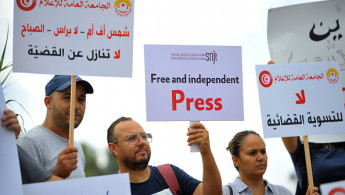Tunisia: 40 attacks documented on journalists in January
The Tunisian National Syndicate of Journalists (SNJT) has documented at least 40 attacks on journalists and photographers in the month of January.
Most of the attacks – 29 in total – occurred during the second round of the Tunisian parliamentary elections, which recorded a low voter turnout, the syndicate said.
The attacked journalists are in fact officially accredited by the Independent Higher Authority for Elections to cover the progress of this process, and were working for 17 different media outlets.
Attacks against journalists and freedom of expression have largely increased since the President Kais Saied assumed presidency in 2019, and intensified even more following his power grab move in July 2021 which granted him far-reaching executive powers.
The syndicate recorded attacks in several cities across the north African county, notably the capital Tunis, Kairouan and Gafsa. Attacks were also recorded in Nabeul, Monastir and Beja.
Most of the attacks were in relation to the journalists’ right to obtain information, according to the report, in light of the obstacles placed by the Electoral Commission to the free flow of information.
The syndicate’s monitoring unit documented 12 cases of withholding information, 11 cases of preventing professionals from carrying out their work, in addition to six cases of harassment.
11 journalists working for six media institutions were attacked outside the election voting period. The incidents include prohibiting the journalist from carrying out their job, and verbal abuse. Other cases include incidents of censorship, harassment and incitement.
The syndicate has called on the Independent High Authority for Elections "to seriously investigate the committed attacks", and called on Tunisian state television to review its statutes, specifically regarding freedom of expression.
Additionally, the electoral authority was accused of "threatening" freedom of expression in December, after it sued a number of outlets and bloggers for alleged violations during a poll on the new constitution, implemented by Saied to boost his powers.
Tunisia has been condemned by rights groups for its cyber crime law – Decree 54 – that has been used to violate the right to privacy and allows for law enforcement to access any information or device, in a bid to stifle criticism directed at Saied.
The country has also recorded several instances where journalists, activists and dissidents have been arrested for critiquing the president, while police forces have often seized media equipment from broadcast stations.





 Follow the Middle East's top stories in English at The New Arab on Google News
Follow the Middle East's top stories in English at The New Arab on Google News


